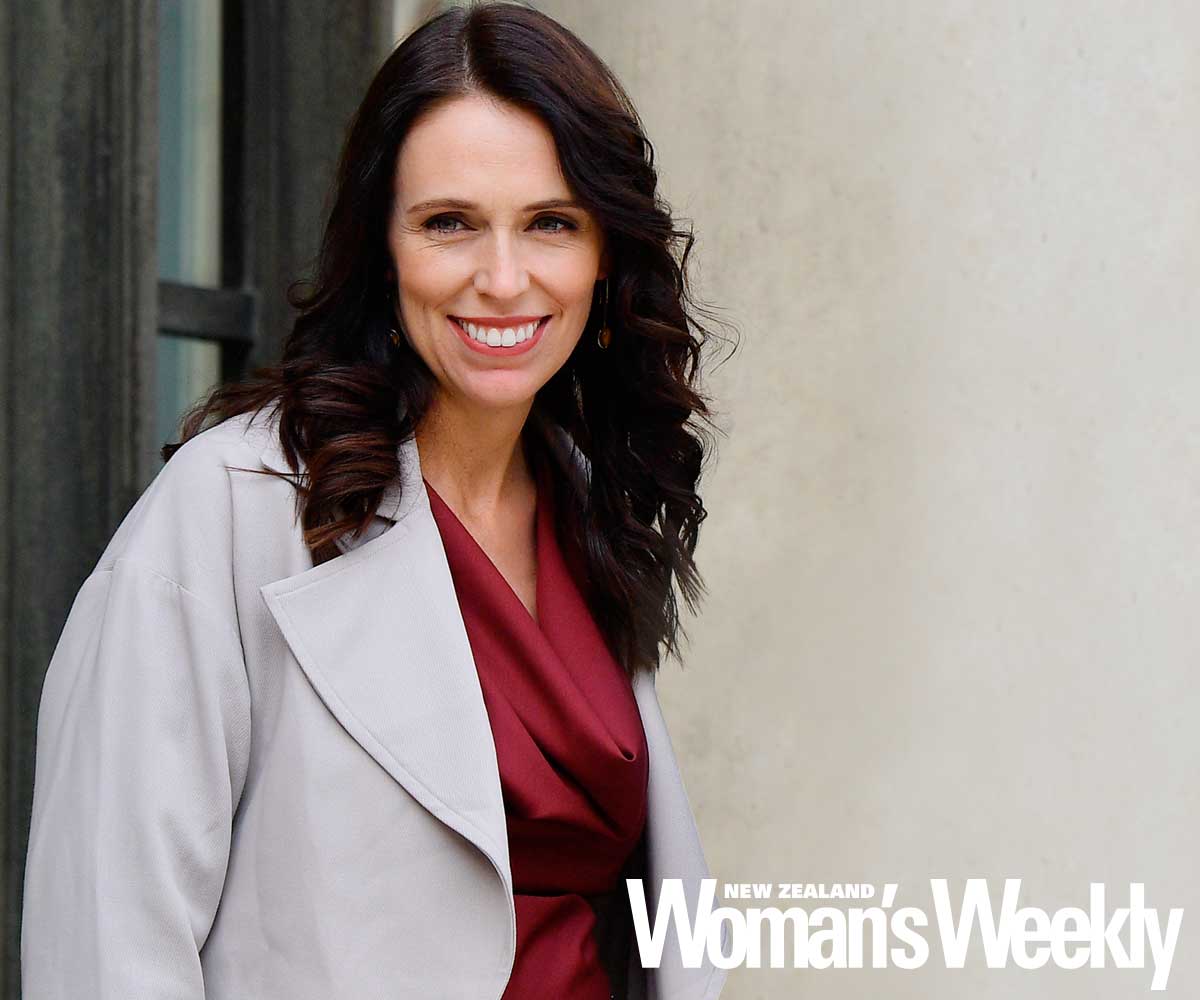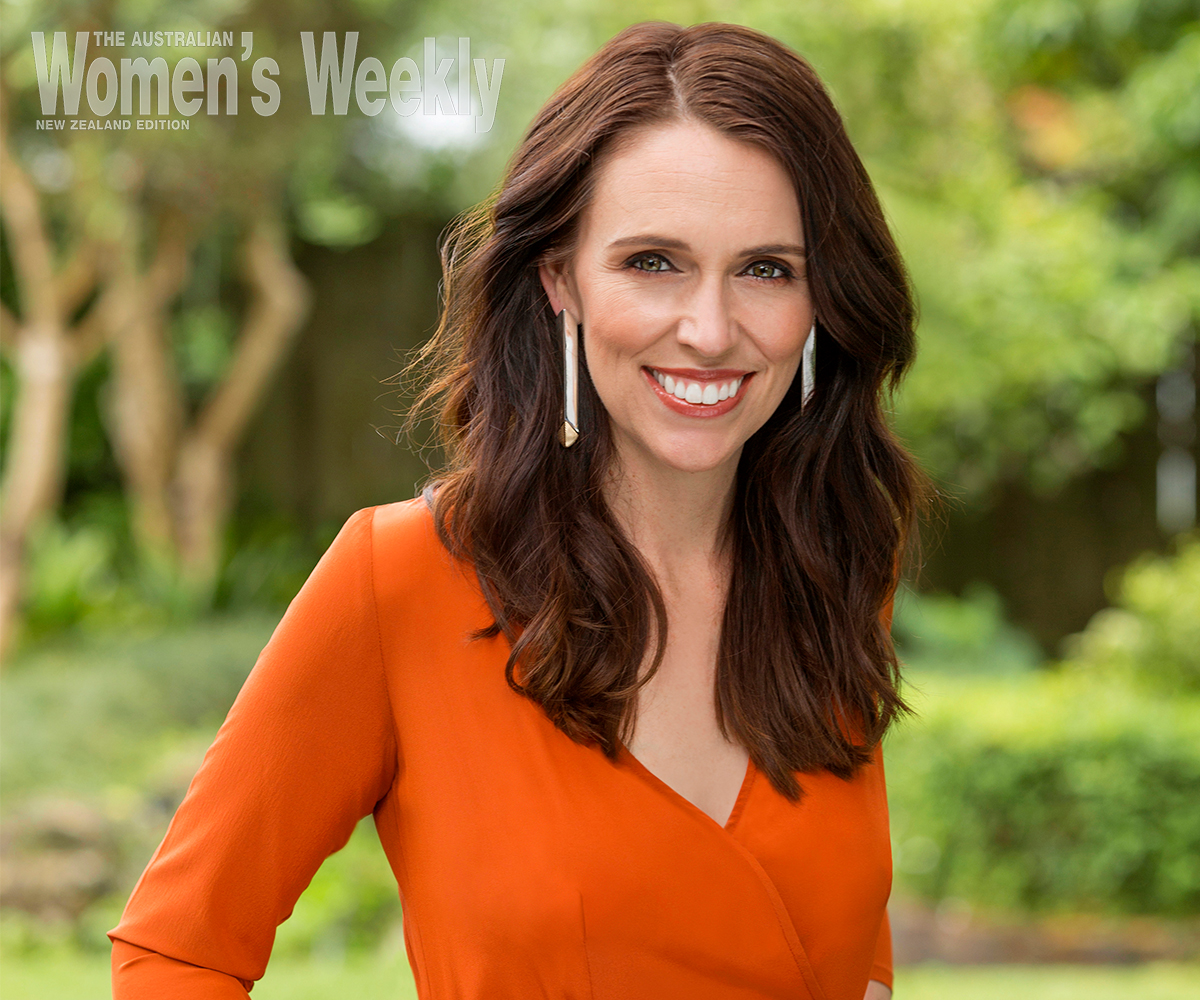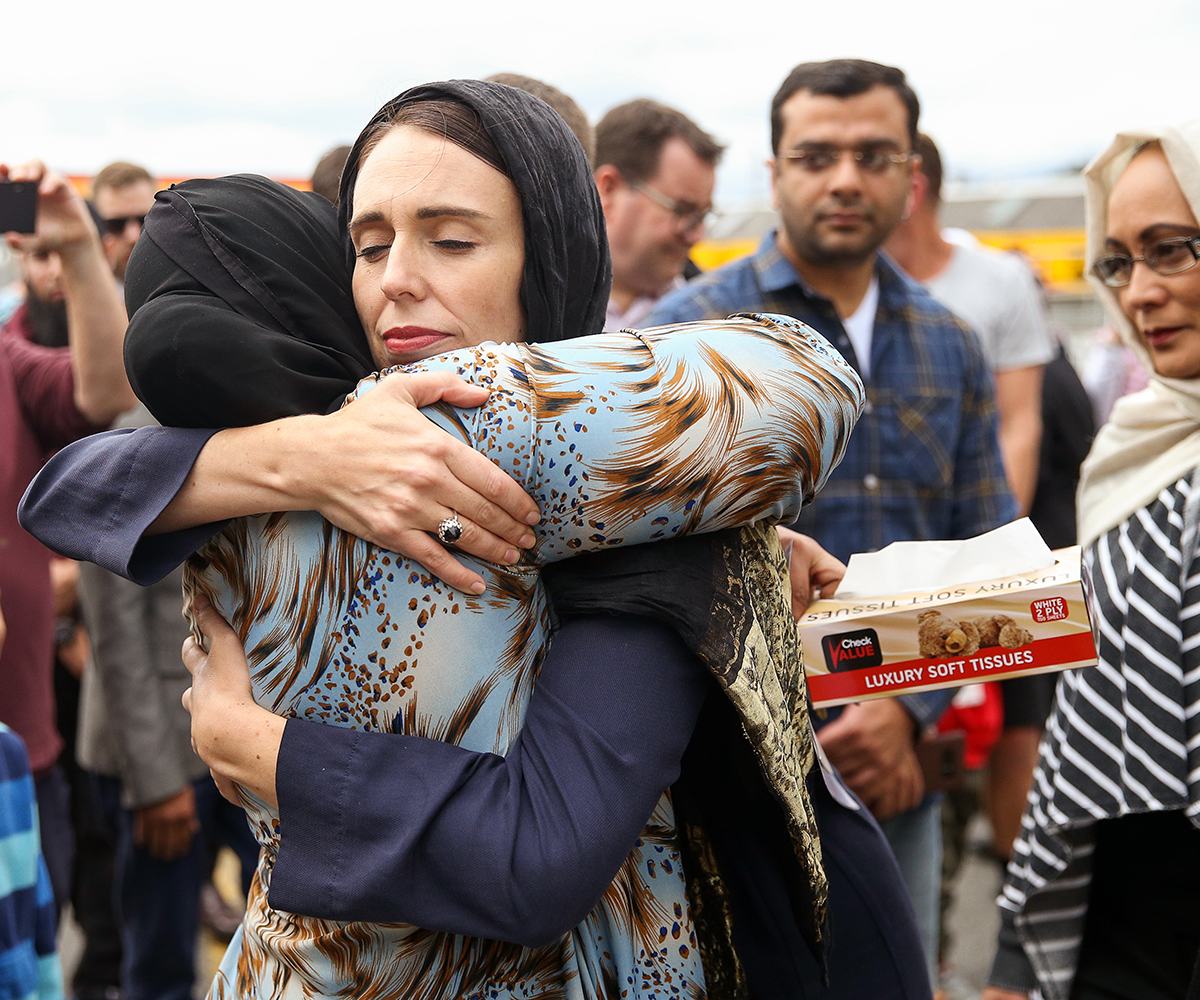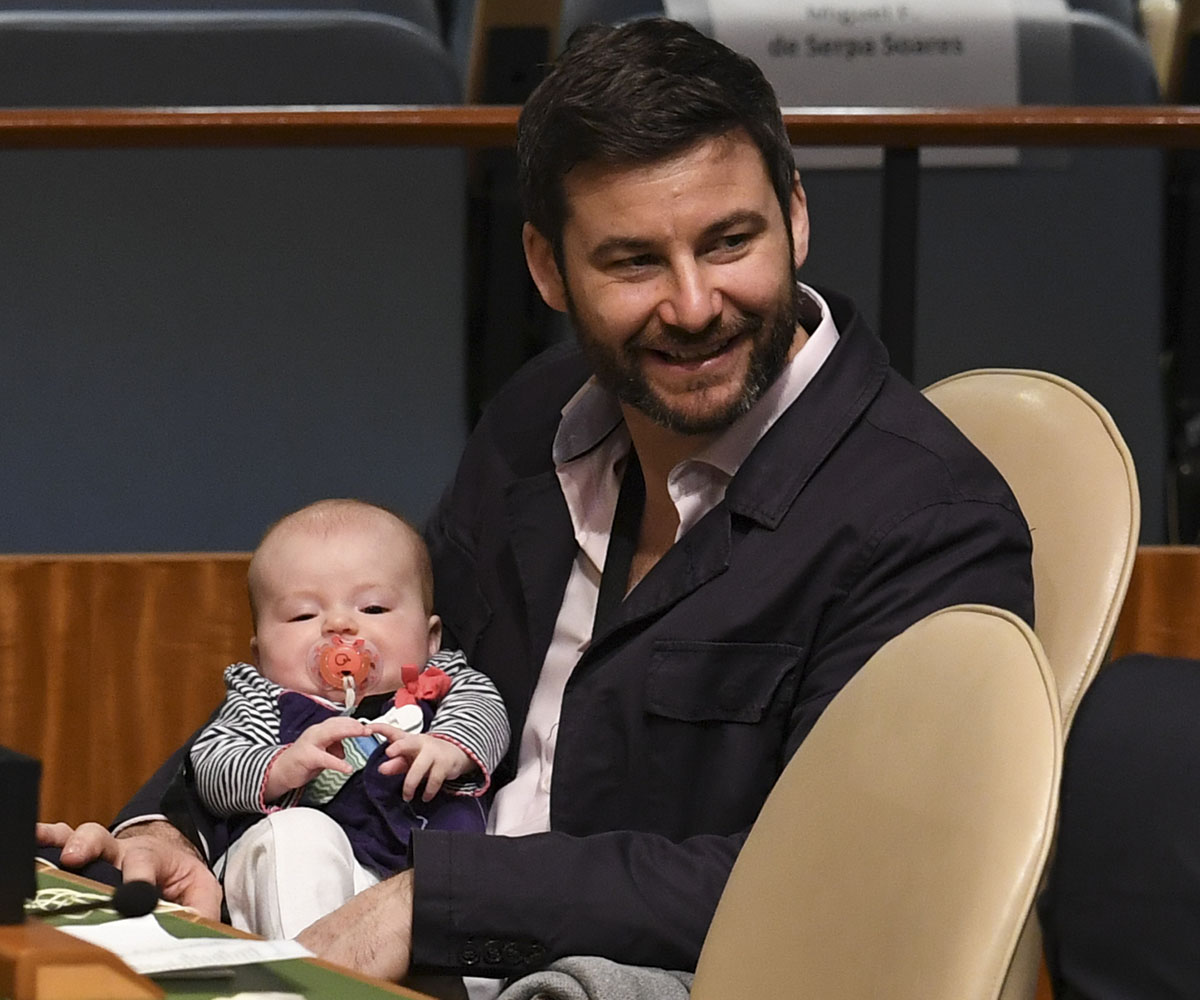This story was published in NEXT magazine two weeks before the March 15 Christchurch mosque attacks.
On the wall of the central Auckland apartment where we are photographing Prime Minister Jacinda Ardern, there’s an artwork by Kiwi sculptor Max Gimblett. It’s a small, brass quatrefoil from his 2015 installation, The Art of Remembrance.
“You know you’re a real adult when you’ve got one of those,” says the Prime Minister.
Among those present, there’s awkward laughter. Should we point out that if you’re running a country, it’s probably safe to say that you, too, are ‘adulting’?
Herein lies the curious duality of our 38-year-old PM. On one side of the scale, she’s the fiercely intelligent, steely and devoted politician who’s firing on all cylinders when negotiating international trade deals, protecting our national security, pushing for solutions to child poverty and climate change, and deftly shutting down her adversaries in Parliament.
On the other, she’s the accidental poster girl for female empowerment and equal opportunities who, despite being a global political sensation, seems almost to forget her own status.
Case in point, her typical weekday desk-lunch of a salad sandwich – sometimes with a bit of egg if she’s feeling fancy. “Pretty dumb,” she deadpans. Never mind that there are likely a dozen minions at the Beehive who would fall over themselves to pop down the road and get her something more gourmet.
“Usually during lunch I’m preparing for Question Time,” she offers, instantly conjuring an image of the world’s worst thrice-weekly WIP meeting where one is live-streamed being taken to task by one’s co-workers, with highlights played on the six-o’clock news.
Point taken, it’s enough to make anyone lose their appetite. Only, I assume that’s not what she meant. For in that environment, Jacinda is in her element.
Earlier that morning, I’d watched her in action at a breakfast for New Zealand’s business leaders, where she gave an update on her economic plans for 2019. When the questions and curveballs came, she was sound in her knowledge and unflappable in her delivery.
“It’s just part of the job,” she says of having to think on her feet.
“You can’t prepare for everything.”
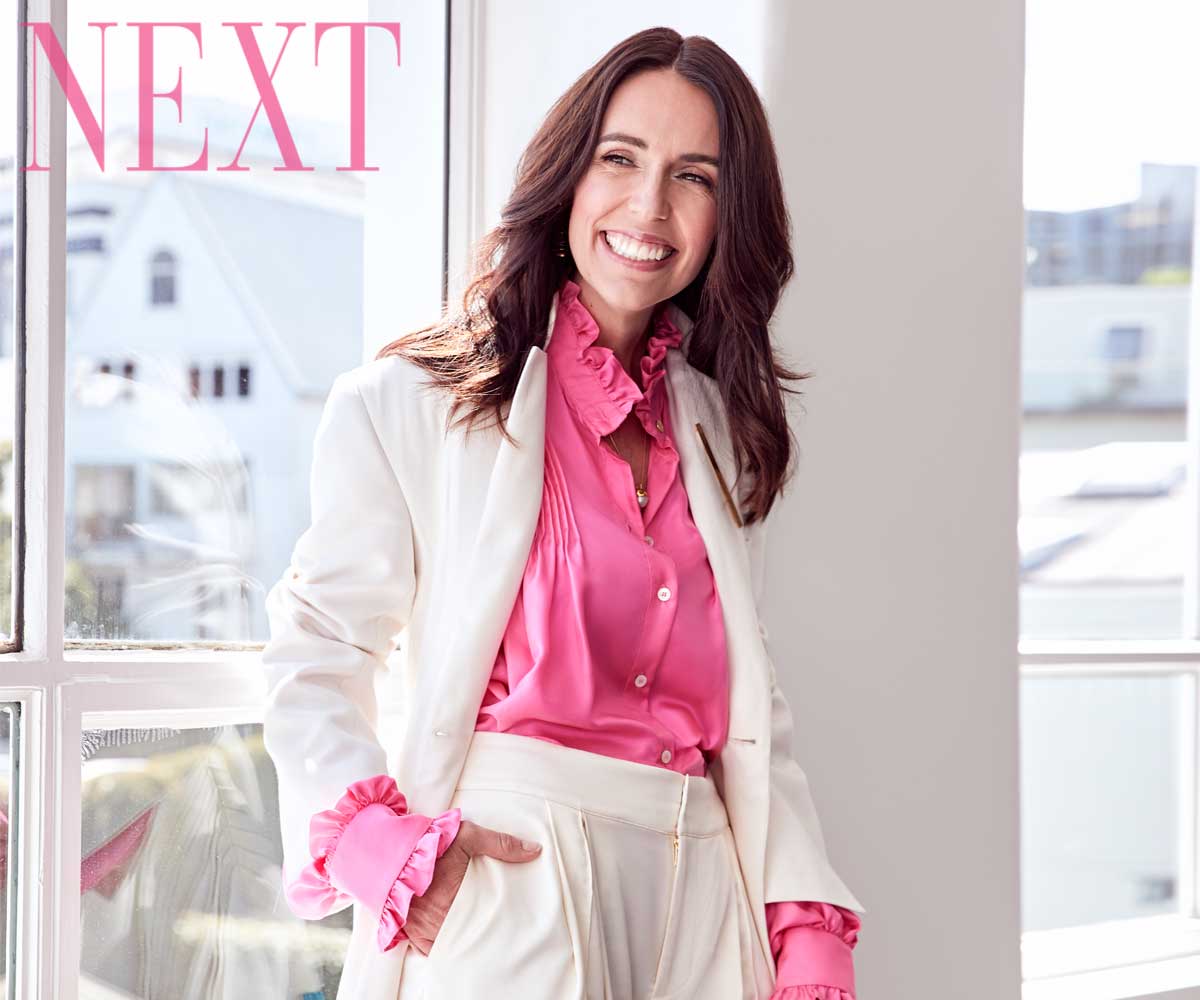
What’s changed since Jacinda became Prime Minister and superwoman mum
As our interview continues, however, I find she does have her supply of stock answers.
“Real progress will be when no one bats an eyelid,” is how she summarises nine-month-old daughter Neve’s appearance on the UN General Assembly floor in September, and the avalanche of positive press that ensued.
It’s a favourite one-liner, frequently pulled out when discussing the UN trip, or being the first female prime minister to take maternity leave, or being a female prime minister full-stop.
Another is that the best parenting advice she’s received (“Do your best”) came courtesy of Barak Obama. Having read this morsel of information numerous times before, I mentally kick myself when I ask the question regardless and the standard response comes back.
There is something to be taken from it, however. I don’t want to say the monotony of the top job, but perhaps the loss of spontaneity that comes with it. This is not, after all, the Jacinda that last featured on the cover of NEXT in July 2017. At the time she was deputy leader of the Labour party – then in opposition and polling dismally with New Zealand’s general election looming.
Appointed Labour’s leader that August after the resignation of Andrew Little, Jacinda quickly turned the party’s fortunes around. Three months later, at 37 years old and, unbeknownst to the country, pregnant with her first child, she became our youngest prime minister in 160 years, and just the third female.
After nine years of National, it was the dawning of a new era for New Zealand, but goodbye to Jacinda as we knew her.
No longer could she moonlight as an amateur DJ or (according to journalists we know) play the role of part-time matchmaker. Gone were the days of texting her for a quick quote on anything from climate change policy to the relationship status of one of her staffers. In fact, to us, she was no longer ‘Jacinda’ at all. In all correspondence with chief press secretary Andrew Campbell, she became ‘the Prime Minister’. Does the Prime Minister require a car park? (Yes, two). Will the Prime Minister have her own security detail? (Yes, someone from the Diplomatic Protection Service will be in touch).
On set, there’s a new kind of formality that didn’t exist previously. There are things she cannot wear, poses she cannot sit in, both being, “un-prime ministerial” (more on that later). Yet she is warm, polite, funny, and accommodating.
We’ve been allowed a two-hour time slot – the blink of an eye in cover shoot terms – and Andrew is clock watching. Ultimately though, the PM pulls rank and suggests we shoot a third outfit, delaying her next appointment by half an hour.
“It’s with the Deputy PM,” she says by way of explanation.
In other words, Winston can wait. A white Paris Georgia coat dress calls.
Jacinda’s whirlwind week: Duchess Meghan, a World Economic Forum, Waitangi and the Tasman fires
With the jetlag and sleep deprivation masked by concealer and false eyelashes (for which Andrew’s lack of enthusiasm earns him a good-natured ear-bashing), you’d never know she’d just run a two-week gauntlet of international and local engagements. Starting in London in late January, there was the sit-down with British PM Theresa May to solidify New Zealand’s trade relations with a would-be post-Brexit Britain.
An audience with Meghan, Duchess of Sussex followed (one likes to think it was to get the duchess’s thoughts on the Shapeshifter album she was gifted during last year’s royal tour of New Zealand). From there Jacinda flew to Switzerland, where at the World Economic Forum in Davos she presented the Labour government’s forthcoming ‘wellbeing budget’. She arrived home to five days of formalities at Waitangi, and then an unscheduled overnighter in Nelson as the Tasman fires took hold of the region.
In the days after our shoot, New Zealand’s tensions with China dominated headlines. You think you’ve had a stressful week at work, then you realise you don’t know the meaning of the word.
“I haven’t had an unproductive day in about a decade,” she laughs when asked if she ever spends a Friday afternoon scrolling through Buzzfeed like a normal person.
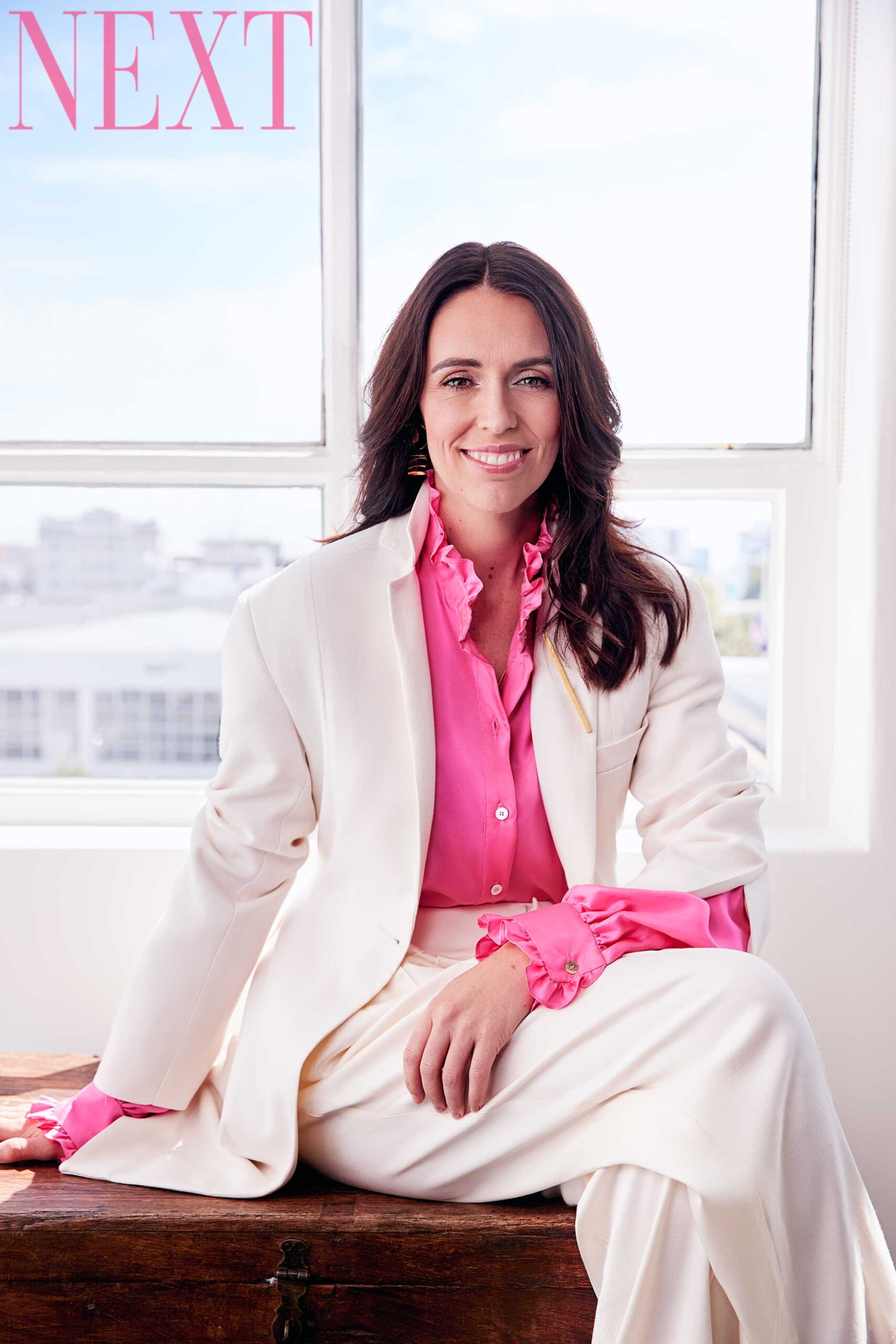
The focus areas that keep Jacinda driven
Allowing herself one weak cup of coffee every few days, enormous mugs of tea are her lifeblood. Other than that, she’s kept going by the knowledge that the buck stops with her.
“In previous jobs there’d be meetings I had to be at, but wasn’t required or expected to contribute. Now, it’s very rare that I’m not the one chairing the meeting. By default, the role means that you’re constantly on. You can’t defer to anyone else, you can’t be like, ‘I’m just going to sit this one out.'”
Of course, the ultimate motivator is a genuine desire to effect change. A self-described “policy wonk”, she says she hasn’t let any of her prime ministerial responsibilities distract her from the work she set out to achieve in the years before taking on the role.
“I wanted to keep a hand in the things that drive me,” she says, referring specifically to her Child Poverty Reduction portfolio, which she holds in addition to Arts, Culture and Heritage, and National Security and Intelligence.
“I love that side of my job. I love the people, I love the ideas. When I was in opposition I took great joy in designing solutions to problems, and to now see some of those coming to fruition is enormously fulfilling.”
The star power of Jacinda’s position
Being so hands-on has its drawbacks – she takes a briefcase wherever she goes and her idea of a quiet weekend involves balancing family time with work obligations.
“We try not to have too many expectations because it’s changeable,” says Jacinda. “But when Neve wakes up we might go for a walk or out to breakfast. And then I read to her and I sing to her and I play with her – simple things.”
Saturday usually includes at least one event appearance, and Sundays are spent sifting through papers and phoning colleagues in preparation for Cabinet.
Back at the office, there’s much discussion as to whether the prime ministerial pay packet of $471,049 per year is worth it. Someone suggests – lest we were concerned about Jacinda’s bank balance – that she will cash in after her time in office, charging a premium to speak at female leadership conventions around the world.
Given the novelty factor (her age, her sex, her pregnancy), it’s likely that her celebrity will endure more than that of most world leaders, regardless of what she achieves in office. But while it might sound to some like a nice retirement plan, you get the sense that it’s not for her. And in any case, let’s not focus too far ahead. She’s not.
“In politics it’s all too easy to be looking to polls and worrying about survival or how to outlast a term,” she says. “I never want to lose sight of what I’m actually here to do.”
The tunnel vision has a secondary function in helping her to forget that it’s not just the eyes of the country on her, but the world. Yes, all politicians are subject to scrutiny. But when you’re one of just five percent of world leaders who are women, and one of only two prime ministers in history to have a baby while in office, the microscope zooms right in.
The week of our cover shoot, a magazine in Poland requests permission to reuse a photograph of the PM from her previous NEXT cover story. It’s to accompany a complimentary profile piece, in line with what’s been written about her in the past year by everyone from Time, Fortune and Forbes, to The Guardian, The New York Times, Grazia and even US Vogue, who painted her as a feminist progressive beacon of hope in a world facing apocalypse.
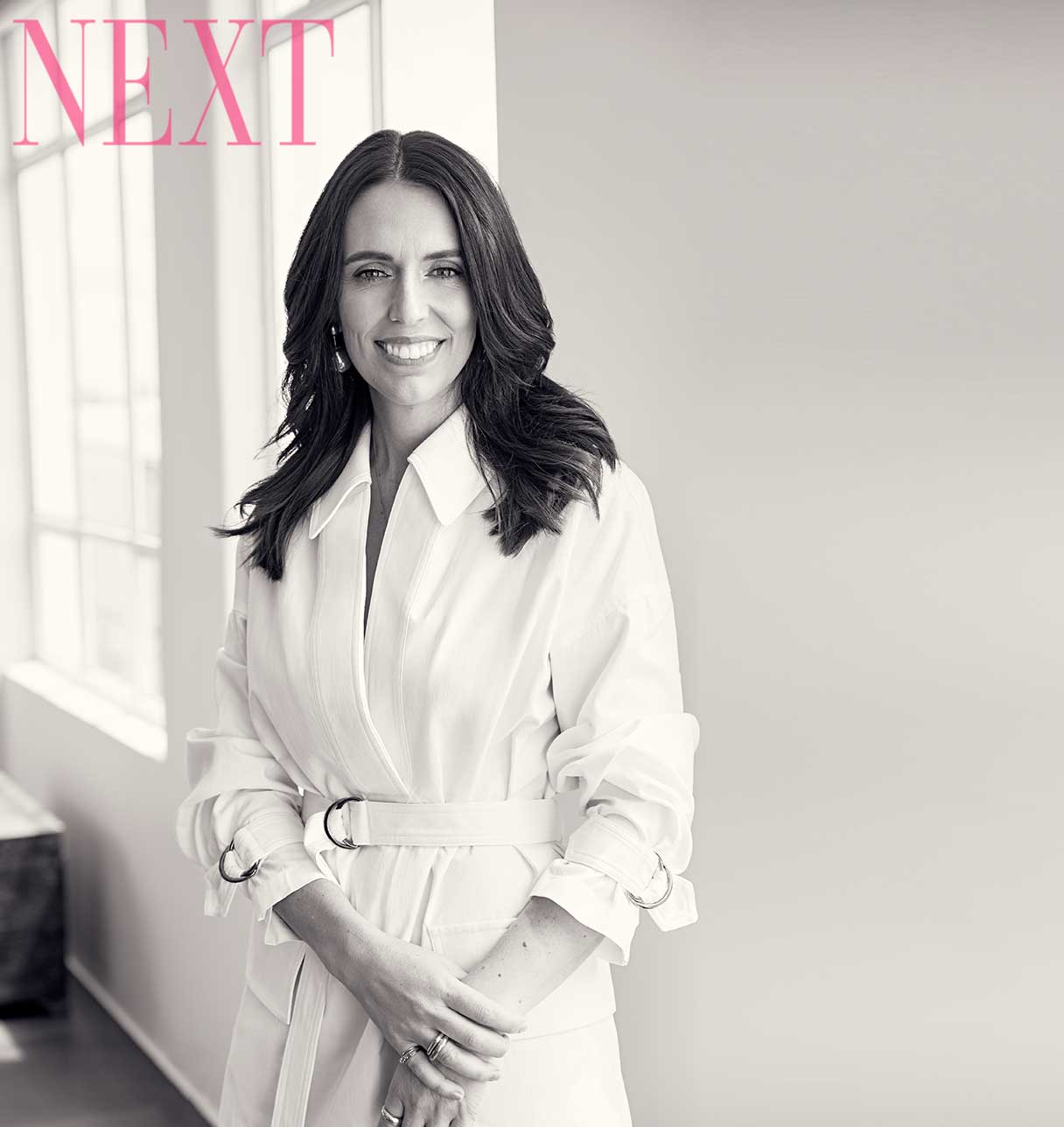
How Jacinda deals with fame
Unprecedented for a Kiwi politician, the international interest is at times a source of bemusement for Jacinda, who rightly points out that she’s not our first, or even second female PM.
“I’m not special in New Zealand,” she likes to remind her admirers around the world.
She’s special to them, however. And while what they write is by and large favourable, one imagines that this elevates the pressure more than it alleviates it.
“It is possible to shelter yourself from that weight of expectation though, and to a certain extent, I do,” she says, when asked whether, as a female PM, she feels an additional responsibility to make a meaningful impact in areas that affect women globally.
“My focus is on what I can do for New Zealand. I know that if I just do my bit in this little corner of the world, that’s a contribution.”
To subscribe to everyone’s definition of feminism would, in any case, be paralysing. This comes to light when our photographer’s request to have Jacinda perch casually on a window ledge with her legs slightly splayed is vetoed. Cleavage, too, is out.
“The Prime Minister isn’t allowed a chest,” Jacinda jokes, before talk devolves into Don-Brash-with-his-shirt-unbuttoned territory.
Some might argue that she’s perpetuating a system of oppression and she should be using her power to move the expectations around parliamentary dress into the 21st century. The sane would realise that she’s damned if she does and damned if she doesn’t. Needless, to say that in this instance, she does up another button and gets on with it.
Jacinda on speaking up for yourself
This reluctance to kick up a fuss extends to television and radio interviews where she’s regularly on the receiving end of all manner of intrusive, inane and irrelevant comments.
“It genuinely takes a lot to offend me,” she says of her usually unfazed reactions.
“I accept that my situation is novel, and that people will have things they want to know, and that sometimes they will be unusual.”
Watch out if things get impersonal, however.
“When it’s not just about me, if I think it will impact other women for me to do so, then I will push back a bit harder,” she says, recalling her infamous spat with The AM Show‘s Mark Richardson over whether it was all right for prospective employers to question job candidates on their plans to start a family.
“I’m happy to be asked this because I opened myself up to it,” she told host Duncan Garner. “But you,” she seethed, her finger in Mark Richardson’s face. “It is totally unacceptable to say that women should have to answer that question in the workplace.”
Why Jacinda says now is the time for change
To say that Jacinda is a proud feminist is stating the obvious. But then, for her, it’s an obvious concept, too.
“Feminism is so simple for me, it just comes down to equality. I’ve seen young women bristle at that phrase, but you just strip it right back and say, ‘Do you think women should have the same rights and receive the same treatment as men?’ And then if someone says ‘yes’, in my mind, that makes them a feminist. It’s not as complicated as people make it out to be.”
It’s something to keep in mind in the milieu of this year’s International Women’s Day celebrations. In addition to the UN’s global ‘Balance for Better’ theme, the local theme of ‘We Too’ was chosen off the back of a speech the PM gave to the General Assembly, which called for unification of the sexes in the name of equality. “Me Too must become ‘We Too’. We’re all in this together.”
One of the first nations to see the sun rise, it was decided that international festivities would kick off here with a breakfast at Parliament co-hosted by Jacinda and Minister for Women, Julie Anne Genter.
It’s not the first time our small nation has paved the way for others, and it won’t be the last. Waiting in the wings right now, for instance, is the aforementioned ‘wellbeing budget’. We won’t know exactly what this entails until it is formally announced in May, but the gist according to Jacinda is that economic success doesn’t just stop with healthy finances, it must consider the health of a country’s people and the environment.
“There’s no replacing the importance of having those economic measures,” she says when asked if a budget that places as much importance on ‘kindness’ as boring old fiscal responsibility isn’t a little idealistic.
“But by themselves they’re not enough. For instance, GDP [Gross Domestic Product] goes up if someone gets a divorce. It decreases if you marry your cleaner. There are all these odd, perverse things about GDP that make it a really incomplete measure. Robert Kennedy once said ‘GDP measures everything except that which makes life worthwhile’, and so we’re really responding to a notion that’s been out there for some time. Which is that yes, we need to make sure the fundamentals of the economy are strong, but let’s ensure that people are benefiting from that, and that our environment’s not being degraded at the same time.”
Measures being put in place by the government “will help to tell that story”, she says, with priorities being set as far as improving our mental health services, and transitioning to a carbon-neutral economy. She’s adamant that “those are things that should be able to happen in parallel to your economy doing well.”
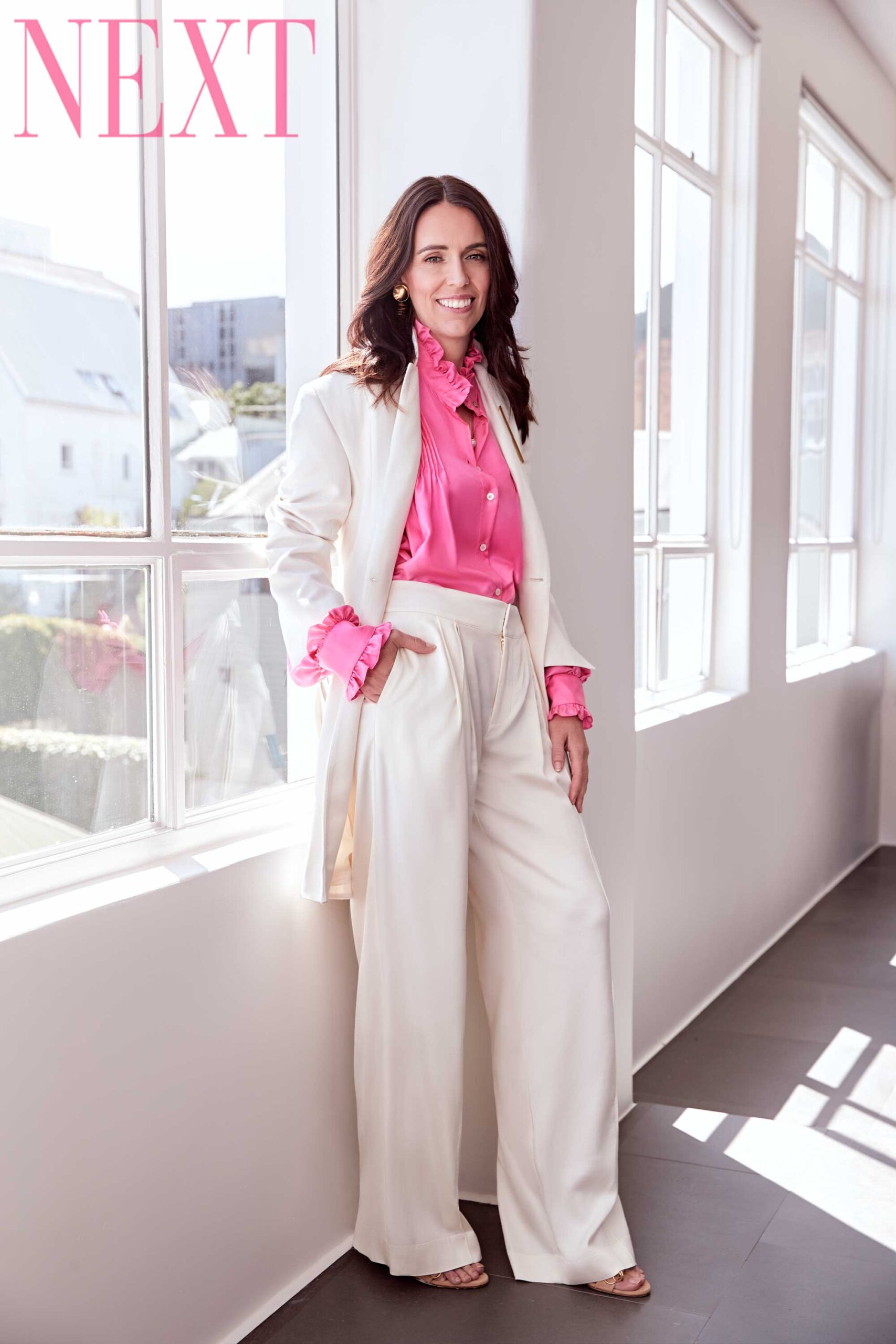
How Jacinda is raising Neve as humbly as possible
With the status quo not working, you can’t blame her for trying something out of the box. And our reputation for innovation precedes us, anyway.
“The world is not only looking for ideas, it is hunting them. And New Zealand is on its list,” she’d proclaimed at the pre-cover shoot business update. A first-of-its-kind budget fits that bill. It also evokes the pioneering spirit that’s part of our DNA.
Indeed, from our suffragette days, Kiwi women in particular have continued to go where no women have gone before. Jacinda says this speaks as much to our sense of adventure as it does to the value we place on equal rights.
“It was a question of fairness and equality,” she says of the suffragette movement. “But underpinning that there was this notion of women seeking fulfilment. Of being able to enjoy lives beyond the domestic sphere.”
There’s no question that Jacinda is living a fulfilling life, yet she herself remains surprisingly domestic. One of her favourite activities is bottling and making sauces.
“I remember a couple of years ago getting so much joy from buying fresh plums and making plum sauce,” she says with a smile.
A political star of global proportions, it’s easy to forget that she enjoyed a typical provincial New Zealand upbringing on an orchard in Morrinsville. But while the small, Waikato town may not have informed her political values – growing up, she says her views put her in the minority – it did inform her approach.
“I knew even then that I had to be open-minded with other people’s opinions, otherwise I was going to be having some pretty combative conversations,” she says.
Incidentally, partner Clarke Gayford also grew up on an orchard – his around 350 kilometres away in Gisborne. It’s a very different backdrop against which the pair is raising Neve, following whose birth Auckland’s Sky Tower was lit up pink for three days. Jacinda admits that keeping her grounded will be an on-going priority.
“Our biggest nightmare is having a spoilt child. That would really bother us.”
But as she launches into an anecdote about buying a ratty old nursing chair off TradeMe and promptly driving out to West Auckland in a ute to pick it up, it occurs that she probably needn’t worry. It’s hard to imagine a humbler PM anywhere.
How Jacinda stays down to earth despite it all
In addition to having second-hand furniture reupholstered, a favourite pastime of Jacinda’s is cooking, and she makes a mean fish pie (with career fisherman Clarke reeling them in you believe her when she says, “I know a million ways with fish.”).
When it’s not been such a good day on the boat and it’s UberEats to the rescue, Jacinda has no problem posing for a selfie with the driver, “even though I’m sometimes looking pretty daggy,” she laughs.
Sure, politicians like to appear relatable. ‘We’re the same,’ they say, before taking off in their private helicopters. With Jacinda though, the claim that she’s “just like everyone else” doesn’t seem like such a stretch.
“I’m very, very ordinary,” she insists. “I’ll go from speaking to a room of 200 people to having pumpkin spat at me.”
The small steps Jacinda is taking to a better world for Neve (and everyone else)
Like all new parents, she says she and Clarke find it difficult to carve out one-on-one time. And while she’s typically separated from Neve during the day (Clarke is the primary caregiver, with Neve’s grandmothers on-call for back-up), Jacinda has had to get used to rolling with the punches that a baby brings.
“There was one regional visit when I was breastfeeding, and I was due to speak at a factory but the last event had run over. I had to say to the driver ‘I’m really sorry, you’re going to have to park around the corner because I have to finish pumping!’ I was sitting in the back of the car and I could see all these people waiting for us and I do remember thinking ‘Oh my goodness, this is a juggle.'”
Of course, unlike many working mums, she’s not going to struggle to pay the bills or the babysitter anytime soon. But by introducing initiatives like increased paid parental leave, she’s doing her part to ensure that those in more precarious circumstances don’t fall behind. Her best days on the job are when she gets first-hand feedback that these initiatives are making a difference.
“Reading the individual stories is better than any report or statistic. Last year I got letters from people who’d received the Winter Energy Payment, to say they were able to keep the heater on longer or that they’d bought extra socks for their kids. On the one hand you think ‘Gosh, doesn’t that say so much about how much more we need to do?’ But on the other, at least we’re aware we’re getting somewhere.”
Getting somewhere. It’s a phrase that seems to sum up where we’re at in the fight for female equality. It’s been a productive couple of years, but as far as closing the gender wage gap or changing a deeply entrenched culture of sexual harassment, there’s still a lot of work to be done – both at home and overseas. So how has having a daughter fuelled this fire for Jacinda? I ask her what she hopes for Neve’s future.
“I hope that she doesn’t feel any limitations. That she doesn’t have any sense of what girls can or can’t do. That it’s just not even a concept for her.”
She could be in worse hands.
